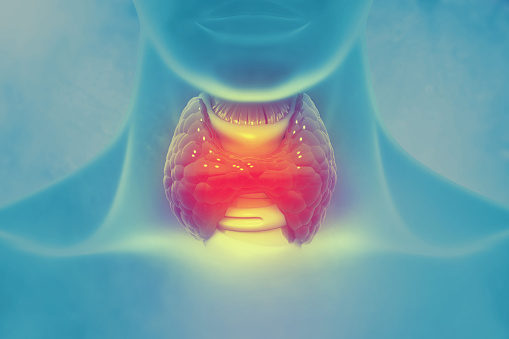Radioiodine Therapy For Thyroid Cancer (General Information)
Thyroid cells have the capacity to take up iodine and iodine is essential for the growth and function of thyroid cells. This principle is utilized in radioiodine treatment of thyroid cancers after initial surgery. Radioactive iodine (called I131) can seek out and destroy any remaining thyroid cells (including normal and cancer cells) that may be invisible at the time of surgery and are inadvertently left behind. I131 therapy is associated with reduced risk of recurrent thyroid cancer. Typically I131 therapy is followed by a whole body scan in 5-7 days. After the scan, patient starts taking Synthroid® (levothyroxine). Patient should be on a low iodine diet for ~14 days before the I131 therapy. Iodine is found in variable amounts in all food and beverages. The highest sources (and therefore those to be avoided during this 14-day period) are iodized salt, grains, cereals, some breads, fish from the sea, shellfish, beef, processed meats, milk and milk products. You can find useful details on www.thyca.org and www.thyroid.org. This diet is generally continued until the whole body scan is completed (7 days after the I131 is given). After I131 you should observe appropriate precautions to avoid radiation exposure to others.
For successful I131 therapy, blood level of a hormone called TSH should be high & the patient should have very low circulating level of natural iodine.
There are two ways of raising blood TSH level.
- By stopping thyroid tablets. Typically, a short-acting thyroid “pill” called Cytomel® (T3) is given after thyroid surgery for 4 weeks and then stopped for ~10-14 days (to prepare for I131 therapy). Patients may develop swelling, fatigue, aches during these 14 days. I131 is given after TSH is confirmed to be high.
- By Thyrogen® method. Thyrogen is synthetic human TSH and is administered as 2 injections which raise TSH without the need to stop thyroid tablet. I131 is then given 24 hours later. A blood test (tumor marker called TG-thyroglobulin) is taken 48 hrs after that and “scan” is done 5-7 days later. In this method, patient can start Synthroid immediately after surgery and does not have to tolerate the symptoms of hypothyroidism.
I131 therapy is generally considered safe and very effective. There is a small risk of temporary or permanent damage to salivary glands. A decrease in white blood cells is sometimes seen. Occasional patients may have nausea or neck discomfort. There is an extremely small increase in risk of secondary malignancies (leukemia etc) in some cases (usually dose dependent). Women should avoid pregnancy or breast feeding for at least 6-12 months after I131 therapy.
For more information:
www.mythyroid.com/radioactiveiodinecancer.html
¤ Timeline for I131 Therapy(Thyrogen Method)
Start low iodine diet Start 10 days before the Thyrogen Injection
Thyrogen injection #1 (Dr. Haque’s office) ______________Mon
Thyrogen injection #2 (Dr. Haque’s office) ______________ Tue
I131 radioactive pill (Nuclear Medicine Dept. Hospital) ______________ Wed
Blood Test (Thyroglobulin level) (Laboratory) ______________ Fri
I131 radioactive SCAN (Nuclear Medicine Dept. Hospital) _____________ Tue/Wed
Resume normal diet _After Scan____
¤ Timeline for I131 Therapy (Thyroid Withdrawl Method)
Start low iodine diet _____________
Stop Cytomel ______________Wed
Blood Test (TSH) ______________ Mon
Office visit ______________ Tue
I131 radioactive pill (Nuclear Medicine Dept. Hospital) ______________ Wed
Blood Test (Thyroglobulin level) ______________ Fri
I131 radioactive SCAN (Nuclear Medicine Dept. Hospital) _____________ Tue/Wed
Start Synthroid and resume normal diet _After Scan____
Blood tests are then done in 2 to 3 months to determine if you are on the right dose of Synthroid.
Post Disclaimer
We are not your healthcare provider, and your use of this website does not establish a patient-client relationship. All the information contained on this website is for informational purposes only. No material on this site is intended to be a substitute for professional medical advice (diagnosis, treatment, testing or nutritional information). Always seek the advice of your physician or qualified healthcare provider with any questions you may have regarding medical or health-related conditions or treatment. Your healthcare provider knows your condition or situation well and can give you specific advice which would be appropriate for your condition/situation. Your healthcare provider can also guide you more accurately about injection techniques, dietary interventions and the use of medical technology that is most pertinent and suitable for you. Please do not disregard professional medical advice or delay in seeking it because of something you may have read on this website.

